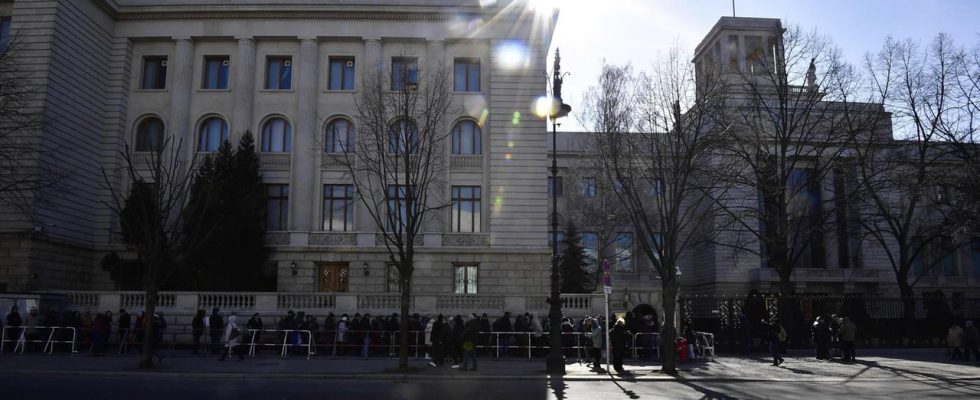At the weekend, Putin wants to be confirmed as Russian president for another six years. Russians living in Germany can also take part. But very few people want to talk about it.
Many people with roots in the former Soviet Union live in Cologne-Porz. Between prefabricated buildings with satellite dishes, next to a supermarket for Eastern European food, there is a small stall that sells shashlik, piroshki and tea. A place for people in the neighborhood to talk to each other.
But not all topics are discussed. “I don’t want my guests to talk about politics. That only leads to tension. Here we eat and nothing more,” says the snack seller. “I want my place to remain a neutral meeting place.
Few speak openly about their political views. One of them is 91-year-old Boris. He proudly says that his vote goes to Vladimir Putin. “Because I like him. I’ve experienced many presidents. And this is the best.” What makes Putin a good president is “his experience, his knowledge – and most importantly: he cares about the people.” But Boris also tries to avoid the topic of politics with friends and family. He doesn’t want a fight.
Snack bar in Cologne-Porz: People don’t like to talk about politics here.
Talking to people here about the upcoming presidential election in Russia is almost impossible. Natasha is also cautious. She has a Russian passport, is against Putin, but does not want to take part in a presidential election in which no opposition candidates were accepted. “My vote won’t change anything. The vote will be whatever suits the Kremlin anyway.”
Natascha doesn’t want her full name to be mentioned – the fear of reprisals against friends and relatives in Russia is too great. “It’s really sad for me to see what my country has become.”
Historically low voter turnout
Voting takes place over three days in Russia. In Germany, voting is limited to one day, Sunday. Russian citizens can cast their vote either at the Russian Embassy in Berlin or at the Consulate General in Bonn.
In previous elections it was also possible to take part at consulates in Frankfurt am Main, Hamburg, Leipzig or Munich, but these had to close at the end of last year. The Russian embassy assumes that this will mean that even fewer Russians in Germany will take part in the presidential election.
But even in the elections, in which all consulates were open, only a fraction of Russians in Germany took part. According to the Central Register of Foreigners, 265,069 Russian citizens over the age of 18 live in Germany. In addition, there are 315,000 people who, according to the 2022 microcensus, have Russian citizenship in addition to German.
According to the Russian Embassy, only 33,853 eligible voters in Germany cast their votes in the 2018 presidential election. 74 percent of them would have voted for Putin.
Sociologist Tatiana Golovo from the Berlin Center for Eastern European and International Studies argues that the importance of such percentages should not be overestimated. “The votes themselves aren’t really the deciding factor. It’s basically about the image being conveyed in Russia: Putin also has supporters abroad.” Exiled Russians could use such elections to destroy precisely this image.
Yuri Nikitin is planning protests for Sunday.
Moral obligation to protest
Golova researches migrants from the post-Soviet space. In the past two years, many opposition members from Russia have come to Germany. These people feel “a kind of moral obligation” to be politically active and demonstrate, said Golova. The reason: Unlike in Russia, here they have the opportunity to oppose the regime in Moscow.
For example, Yuri Nikitin. He is chairman of the Free Russia NRW Association. He says he has always been against Putin. But he doesn’t want to take part in the coming election. “Voting Putin out is completely unrealistic. In a functioning democracy that would be possible, but not in Russia.” That’s why he decided not to take part for the first time. “This election is just a game and I just don’t want to take part in it.”
Nikitin is planning protests for Sunday. He has observed that more Russians have become politically active in Germany in recent years. “The arrest of Alexei Navalny has awakened many sleeping activists.”
In Nikitin’s family, the topic of politics is a sensitive one. He understands why many would prefer to avoid the topic. “If you want to spend a peaceful time with your relatives, there are certain things you just don’t talk about.”

